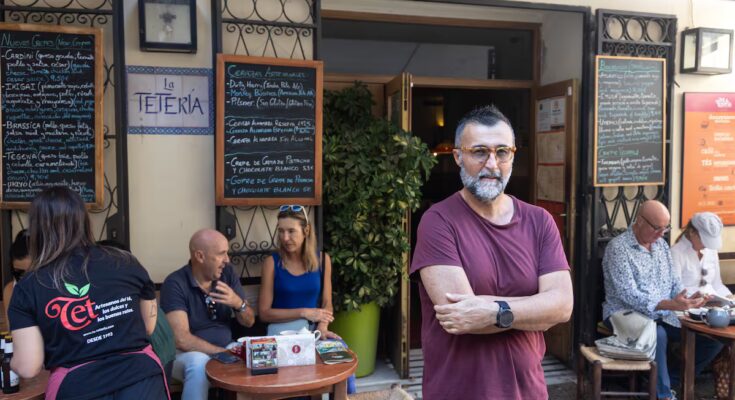They looked for some photos, bought second-hand furniture and did the work with the help of friends. They were in their early twenties and had practically no money or experience, but they had a lot of desire and enthusiasm. Fernando Marín, Marta Ferrer and Alejandro Camacho had appreciated the spirit of the Granada tearooms of the 1990s for several years and wanted to transfer it to their city, Málaga. They chose San Agustín Street, in a historic center then full of lots, abandoned buildings and no news of tourism. The business worked from day one and then managed to overcome all the economic crises and the Covid-19 pandemic. Now that everything is better than ever in the Andalusian city, they will definitively lower the shutters: the building where their headquarters is located has been sold, their lease is expiring and to renew it they have asked for up to four times more than the current rent.
“It’s the market. There’s nothing we can do about it. We’re very sad, but we had already assumed it,” says Camacho, 57, the only original member of the institute. Six tiles on the facade bear the name of the business: La Tetería, with no other surnames. There are half a dozen tables in the doorway, occupied at virtually all hours. Inside, another 15. Plus 17 types of cake, 13 crepes, 150 varieties of teas and infusions and several craft beers in a varied menu that also includes spelled pastries, Moroccan desserts, sandwiches and a local classic, the mixed Smurf.
On December 31st it will close its doors forever after 32 uninterrupted years. Despite its relative youth, it is one of the most traditional venues in central Malaga, where tradition is disappearing at a frenetic pace, as the book clearly states. Historic shops in Malaga (Ediciones del Genal) by researcher Fernando Alonso. The work traces the history of 35 factories with more than 50 years of existence, but since its publication in 2018, a third of them have closed.
“That’s why I did it, because everything was being lost,” Alonso says. Calzados Hinojosa, the El Llavín hardware store, the Café Central or Zaldihogar have disappeared in recent years while tourist houses have multiplied. “Those floors are the heart of the problem,” says the author. “In a short time everything we knew will disappear without coming back, which means the loss of the city’s identity and idiosyncrasy,” laments those who accumulate memories, precisely, in this tea room. “Which inhabitant of Malaga hasn’t been there?” he asks.
“Many people have told me that they had their first date at such a table or that they wanted to celebrate their wedding here. Memories accumulate, but now everything is different. The charm of Malaga has been lost. Many of our local customers no longer come to the tea shop because they barely pass through the center, which they see as a theme park. Of course, more tourists come,” Camacho acknowledged on Monday as hundreds of people crowded the narrow San Agustín street in front of his shop’s door.
Most were visitors heading to the Museo Picasso Málaga, which had a long queue at its doors. It was not a coincidence but the result of the coincidence of three cruise ships in the port of Malaga with more than 10,000 passengers on board, according to data from the Port Authority.
Leave as the only option
The shop has been active since its opening on December 22, 1993, although “at that time it was scary to walk down San Agustín street, it seemed dangerous like many other areas of the center”, explains Camacho. Since then they have carried out three renovations, undergone seven years of work on the Picasso Art Gallery and have seen how their street has gone from being dark and scary to becoming one of the epicenters of Malaga’s historic centre.
The inauguration of the museum in 2003 brought more foreign customers and, therefore, that year it was decided to extend the opening hours until breakfast. They are open every day from 9:00 to 21:00. The staff is made up of 17 people and, although profitability is not high, it serves to maintain the business. For this reason they paid the rent every month without delay, even though this did not help them at all. “I thought, silly, that the trajectory, the journey of all this time, that we have always paid for would be taken into account; but what people want is to earn as much money as possible in the simplest way possible,” he admits.
Their last contract was signed ten years ago with the real estate company that then owned the building, which in addition to the commercial premises has 15 apartments on three floors. The following year the company went bankrupt and the entire ownership passed to Banco Santander, which practically ignored it. In that period the apartments filled up with squatters, with whom Camacho assures that he had almost no problems. “I simply asked them to respect us because we earned a living. And there was no bad relationship,” he stresses.
A couple of years ago an investment fund acquired the property. Then their manager warned that they wanted to renovate the houses and sell them one by one, including the tea shop space, but that the market price would probably be above their means. They managed to evict the squatters, but eventually changed their plan and sold the block again to a Mexican businessman. He warned that he would like to work for a year to create tourist apartments and that, after that, Camacho and La Tetería could return, but paying almost four times the rent. “It was impossible,” he says.
“Now it seems that he has changed his mind and wants to sell everything again, so everything is very uncertain and we saw that there was no other solution than to leave. I thought about moving elsewhere, even to a neighborhood, but the prices are impossible. So nothing, I decided that I had had enough of the hospitality and I preferred to close down”, he underlines. His speech, however, is not defeatist. “We are not champions against gentrification. The problem is that the system works like this,” he explains. “They have fixed up the centre, they have opened hotels, people come, there is more demand and prices are skyrocketing. Maybe in the future it will be regulated, but at the moment it seems impossible. And this ends up driving us out, even if it is also true that Malaga is more beautiful and that, for example, there are more job opportunities for young people”, he underlines that yes, he experiences with “great sadness” the closure of a tea shop to which he has dedicated his whole life.
Therefore, to leave with a good taste in your mouth, we organize one last day of celebration on December 31st, when we plan to open the shutters, ring the bell, welcome friends and regular customers and say goodbye to a business that has given personality to a city that is rapidly losing it.



